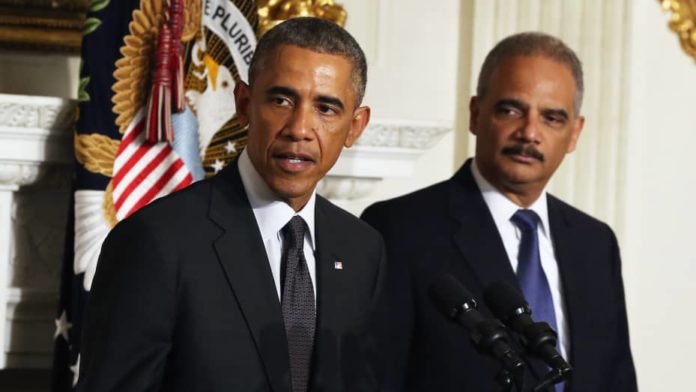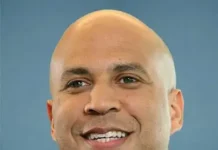When injustice becomes law, resistance becomes duty.
–Thomas Jefferson
What would the Democratic Party look like today if the administration of President Barack Obama would have prosecuted the senior executives of the nation’s largest financial firms that caused the 2008 recession?
- Could those prosecutions have prevented the election of Donald Trump?
- Could those prosecutions have shown that justice is indeed blind to criminals, regardless of their wealth or whether they are white-collar or blue-collar?
While the Democratic Party is now attempting to rebuild its energy level and reconnect with former constituents, these questions are more appropriate today than ever before.
That’s because the events leading up to the global financial meltdown and the thousands of hours of televised hearings and media coverage that spanned from 2007 to 2009, made the 2008 recession the most covered financial event in history.
It was also the costliest. As a result of the 2008 fraud-led recession, American households collectively lost $19.2 trillion in their net worth and investment losses.
Obama certainly had the resources. He had the US Justice Department (led by then-Attorney General Eric Holder), and all the appropriate financial regulatory agencies, including the SEC and the U.S Treasury (then led by Treasury Secretary Tim Geithner). These and other federal agencies had authority over the institutions involved in the mortgage frauds.
If Obama coordinated his resources, he could have captured the political attention of the entire nation. In the process, he would have sent a clear message that there was one standard and system of justice for white-collar executives, as well as average Americans.
Instead, Obama, Holder, and others in his administration, collectively moved to the sidelines and eventually to the security of their closed locker rooms. For them, they decided the game was over. This meant those highly compensated, financial executives would never be held responsible for causing the worst recession in U.S. history.
This was a devastating mistake for the following reasons.
- It was an irrecoverable opportunity for the Democrats to show there was a single justice system for rich and poor Americans;
- It was an opportunity to dust off the Democratic Party’s populist history, and possibly steal some of the right-wing populist appeals that Donald Trump later used against the Democrats;
- It was time to restructure the financial system to make it more risk-averse, transparent, and accountable to regulators.
Instead, Obama and Holder did nothing.
Their conscious inaction fueled cynicism about the U.S. justice and financial systems. Their inaction helped fuel Donald trump’s fake populism and degraded the Democratic Party. The impact of their failed responsibility to prosecute those who cause the 2008 recession is a reason why the Democratic Party has alienated many of its members and why it is floundering today.
Why the Obama Administration Failed to Prosecute
The banks and investment firms involved in the 2008 mortgage fraud caused the largest financial institution failures in US history. This amount is estimated at a total direct cost of crisis-related bailouts on a fair value basis of $498 billion, which amounted to 3.5% of the gross domestic product in 2009, according to Professor Deborah J. Lucas, of the MIT Sloan School of Management.
The systemic failure of banks required an unprecedented bailout of the largest US financial institutions by the Federal Reserve. Due to its size and dollar amount, this financial car wreck involved the most powerful political forces in Washington. Unraveling it and prosecuting those responsible required a large, interdepartmental federal investigation.
Worse, due to its scope, financial destruction, and visibility, deciding who to prosecute were radioactive from the start.
The 2008 Recession Showed Why Washington Hates to Investigate Itself
Like the magic mirror in Snow White, every elected official in Washington is the fairest of them all.
This means Washington hates to investigate itself. It especially hates investigations that are televised and fueled by the many Americans who were outraged at losing their homes, retirement accounts, and jobs, as a result of the mortgage frauds and the resulting recession.
So, as the eyes of the nation were watching this financial failure unfold, a key event that most Americans were looking for was the prosecution of those who caused and benefitted from the mortgage frauds, and related investments. After all, what else is the U.S. Justice Department, which was then administered by Attorney General Eric Holder, mandated to do with a failed scheme of this size?
Well, it turned out that Holder and other regulators at the SEC and other banking agencies, all decided to head for the exits.
According to Paul Pellatier, the former senior prosecutor who spent 25 years in the U.S Justice Department Criminal Division’s Fraud Section, “people didn’t get prosecuted during the financial crisis or high-level executives simply because of a lack of commitment, competence, and courage by the political leaders in the Department of Justice. That’s what I observed. That’s what I saw. That’s what I felt. And that’s why I left the Department of Justice,” Pellatier said.
Pellatier was certainly not alone in his observation that Holder’s Justice Department was violating its duty.
Writing in the New York Review of Books (Jan. 9, 2014), Judge Jed S. Rakoff, United States District Judge for the Southern District of New York, commented on Holder’s failure to prosecute compared to previous financial fraud cases. His comments are worth quoting at length here:

“The Great Recession was in material part the product of intentional fraud, the failure to prosecute those responsible must be judged one of the more egregious failures of the criminal justice system in many years. Indeed, it would stand in striking contrast to the increased success that federal prosecutors have had over the past fifty years or so in bringing to justice even the highest-level figures who orchestrated mammoth frauds,” according to Rakoff.
“Thus, in the 1970s, in the aftermath of the ‘junk bond’ bubble that, in many ways, was a precursor of the more recent bubble in mortgage-backed securities, the progenitors of the fraud were all successfully prosecuted, right up to Michael Milken.”
“Again, in the 1980s, the so-called savings-and-loan crisis, which again had some eerie parallels to more recent events, resulted in the successful criminal prosecution of more than eight hundred individuals, right up to Charles Keating. And again, the widespread accounting frauds of the 1990s, most vividly represented by Enron and WorldCom, led directly to the successful prosecution of such previously respected CEOs as Jeffrey Skilling and Bernie Ebbers.”
“But the stated opinion of those government entities asked to examine the financial crisis overall is not that no fraud was committed. Quite the contrary. For example, the Financial Crisis Inquiry Commission, in its final report, uses variants of the word “fraud” no fewer than 157 times in describing what led to the crisis, concluding that there was a “systemic breakdown,” not just in accountability, but also in ethical behavior.”
“As the commission found, the signs of fraud were everywhere to be seen, with the number of reports of suspected mortgage fraud rising twenty-fold between 1996 and 2005 and then doubling again in the next four years. As early as 2004, FBI Assistant Director Chris Swecker was publicly warning of the “pervasive problem” of mortgage fraud, driven by the voracious demand for mortgage-backed securities.
“Similar warnings, many from within the financial community, were disregarded, not because they were viewed as inaccurate, but because, as one high-level banker put it, “A decision was made that ‘We’re going to have to hold our nose and start buying the stated product if we want to stay in business.’”
Rakoff also noted the responsibility of a federal judge to apply the law equally to all cases. “To a federal judge, who takes an oath to apply the law equally to rich and to poor, this excuse—sometimes labeled the “too big to jail” excuse—is disturbing, frankly, in what it says about the department’s apparent disregard for equality under the law.”
“But if we are talking about prosecuting individuals, the excuse becomes entirely irrelevant; for no one that I know of has ever contended that a big financial institution would collapse if one or more of its high-level executives were prosecuted, as opposed to the institution itself.”
Rakoff’s critique was also shared by Neil Barofsky, the former special inspector general in charge of oversight of the Troubled Asset Relief Program. Barofsky found that regulators “made almost no effort to hold accountable the financial institutions they were bailing out, to wonder whether the government, having helped create the conditions that led to the seeming widespread fraud in the mortgage-backed securities market, was all too ready to forgive its alleged perpetrators.”
“The Department of Justice’s position, until at least recently, is that going after the suspect institutions poses too great a risk to the nation’s economic recovery. So, you don’t go after the companies, at least not criminally, because they are too big to jail; and you don’t go after the individuals, because that would involve the kind of years-long investigations that you no longer have the experience or the resources to pursue.
More Federal Agencies To Blame for the 2008 Recession
But the problem was deeper than Eric Holder’s intentional disregard for prosecuting the white-collar financial executives who caused the failure and then managed to keep their jobs. The SEC also looked the other way.
According to one Washington insider, when the SEC decides to investigate a case with the intent of prosecuting it, the agency looks at how it will impact the political donation stream. Donations play a huge role in Washington lobbying, and the financial services industry (banks, insurance companies, securities-investment firms, private equity, hedge, real estate) has historically been the largest source of political donations to both parties in Washington.
The latest data from Open Secrets showed that securities and investment firms were the top donors of any other industry by making a total of $43.7 million to Congress. However, that is money that has federal limits on contributions.
Another study by Americans for Financial Reform found that financial-services firms and trade associations, and their employees, spent a record $2.9 billion on campaign donations and lobbying in the 2019-20 election cycle.
Any observant voter knows that people and associations that make significant political contributions expect to get results for their money. This is true when it comes to all types of donors.
In the case of the money industry, many of the top donors who approved these contributions leading immediately up to the 2008 mortgage fraud event, were expected to be treated with velvet gloves. Eric Holder, the SEC, and other appropriate federal regulators were only too happy to comply.
Corporate Lawyers Never Prosecute Future Clients

But Holder did not make his decision not to prosecute in a vacuum. Holder, a corporate lawyer with Covington and Burling in Washington DC, conferred with Obama’s advisor Valerie Jarett, about whether to prosecute.
According to a researcher, Jarrett and Holder made the decision to walk away from prosecution since it would jeopardize future fundraising if the executives went to trial. The researcher said Obama deferred to Jarrett on this matter, as he did on other significant decisions made during his presidency.
Holder was a white-collar defense lawyer before, during, and after he served as US Attorney General under Obama. It is not surprising that Holder’s firm boasts of being a premier white-collar defense legal firm.
Their own website boasts of their expertise in defending top executives. “Covington is recognized as a premier white-collar firm, with lawyers that possess an unsurpassed depth of expertise in the full range of white-collar issues.
“Our lawyers have decades of experience with the regulators and enforcement authorities with whom our clients interact, and we have a reservoir of credibility that can be leveraged on behalf of our clients.
“With one of the largest white-collar practices in the world, we are one of the few firms with lawyers who recently held senior positions in the U.S. Department of Justice.
“Our team includes a former U.S. Attorney General (Holder), former senior SEC officials, a former Secretary of Homeland Security, two former heads of the Justice Department’s Criminal Division, former federal judges, numerous former federal prosecutors with extensive criminal trial experience, as well as former senior Treasury Department, State Department, and EU officials. Covington also has a deep bench of other highly experienced white-collar lawyers who zealously defend clients in any type of white-collar case.”
So, it’s no wonder that Holder did not need any prodding when he and Jarrett decided that prosecuting white-collar bank executives would be bad for their businesses. Jarrett, who enjoys a special status with the Obamas, is described in a Wikipedia entry as having “a fierce sense of loyalty and a refusal to publicly say anything that may reflect poorly on the candidate (Obama)—or steal his thunder.”
People who followed her career with Obama said she routinely advised Obama to not make important decisions until public polling showed what direction was the most favorable, regardless of whether it was the bold, justified thing to do. Obama, who had a difficult time making decisions on most important matters (as described in the book, Leading From Behind, by Richard Miniter), naturally deferred to Jarret and her tepid version of advising on presidential leadership.
So, with the limp advice of Jarret, and the pre-disposition of the white-collar defense lawyer, who was masquerading as the U.S. Attorney General, Eric Holder, it was expected that the administration never prosecuted any of the senior executives who caused the 2008 recession.
In the process, they also showed the American people that justice is definitely not blind.
Saving Fannie Mae and Freddie Mac
In addition to the blatantly political decision by Jarrett and Holder to head for the sidelines, the Justice Department had other reasons for not prosecuting.
All this was complicated because Federal regulators failed to regulate the creation and sale of complex financial derivatives in the first place. This failure meant federal regulators at the Federal Reserve, SEC, Federal Home Loan Bank Board, as well as officials as the private Freddie Mac and Fannie Mae mortgage agencies, all played a key role in the debacle.
As the investigations unfolded, it became clear the investment firms had created a Frankenstein financial monster, something powerful that was created with too many pieces no one could control. This meant people at all levels of the entire derivative financial-administrative structure could be blamed for the debacle.
Regulators at the state and federal levels blamed banks. Banks blamed investment firms that created and packaged the consolidated mortgage-backed derivatives. Individual mortgage borrowers said they were misled. The Federal Reserve, which sits at the top of the banking pyramid, tried to cover its tracks.
“Ben Bernanke, then-chairman of the Federal Reserve, ignored the housing crisis even though it was a rare three-sigma event that has never occurred in U.S. history,” according to Jeremy Grantham, Chief Strategist of Grantham, Mayo, & van Otterloo, a Boston-based asset management firm.
On the legal side, in 2013, Attorney General Holder said some financial institutions had become “so large” that it made it “difficult for us to prosecute them.”
But Holder’s excuse was patently false and intentionally misleading. No financial institution in 2008 would have ceased operations if its senior executives were convicted of mortgage fraud-related charges.
As a result, the CEOs of major banks escaped criminal prosecution. The media reported that Federal prosecutors considered cases against some CEOs, but never developed them for prosecution.
More Fallout From Obama’s Failure
However, there were also other ways this injustice affected Americans.
Obama’s leadership failure on the 2008 mortgage fraud has proven to be a cancerous political choice for a few reasons:
First, the scope of the financial failure ranked as one of the greatest crises in history, according to 64% of respondents in a Gallup poll. A decade after the financial crisis, Americans still had little faith in the US capitalist system.
“The financial crisis that sparked the 2008 recession seems to have permanently altered Americans’ opinions about banks and the stock market,” according to the Hill.
“The financial crisis had a searing impact on public opinion,” Karlyn Bowman, a senior fellow at the conservative American Enterprise Institute, said in September 2018 on Hill.TV, a decade after the financial meltdown. “People thought our financial system was going to collapse and they’re not that confident that it’s secure today.”
It also was evident that the 2008 crisis was the focal point of news for months. Some 80% of Americans in a Gallup poll said they followed the news about the financial crisis and the Bush administration’s proposals to bail out the banks, especially as it focused on the shortcomings of the Bush administration and its management of the crisis.
Obama’s failure to prosecute also harmed the reputations of Wall Street and its seemingly infallible executives who lead the world’s largest financial institutions. “Even as the 2008 recession fades into history, the public seems to have remained more skeptical. According to the 2018 Harris Poll data cited by Bowman, 48% of Americans say they have “hardly any confidence” in Wall Street leaders. Just 7% said they had a “great deal.”
So, as Democrats have done many times before, they wasted this political layup shot because they never forced Obama and Holder to prosecute the financial executives.
The Real Victim Was the Public’s Perception of Justice
The failure of the Obama administration, and the short-term and greedy decision by Jarrett and Holder not to prosecute, sent a hard message to the American public: there are two systems of justice: one for the rich and another for average Americans.
This message was very clear to Republicans and Donald Trump. Both stirred up their fake working-class populist message, wrapped in nationalism.
Of course, there were other political hooks to hang on the Democrats, but the best issue was the failure to prosecute which showed how Washington insiders protected their own.
Yes, the Republicans benefitted more from huge donations from the investment industry, but money in politics is part of the American oligarchy. It’s not new.
Instead, Trump fueled the outrage. He fanned the flames of privileged elites and corrupt and inept federal prosecutors who violate the justice system. All this added more hatred for Washington insiders, and in this case, Obama’s Democratic administration, and his corporate, white-collar defense Attorney General.
So, did all this turn a critical sector of voters towards Trump? My bet is that it did and this distrust of the justice system persists today. Obama, Jarrett, and Holder acted in their own self-interests.
There is Big Money in Injustice
Today, Jarrett administers the Obama Foundation in Chicago, while Holder returned to his job in Washington as a white-collar defense lawyer, a position he really never left.
On the financial side, their decisions not to prosecute proved to be very lucrative. Today, Obama has a net worth of $70 million, Jarrett is worth $12 million, and Holder has a net worth of $12 million.
As for those millions of average Americans who lost jobs, houses, and savings as a result of the 2008 recession and its aftermath, statistics showed that it took about a decade for them to recover their losses, and regain their previous net worth.
It’s no wonder people never talk about the fairness of the justice system with elected officials.











